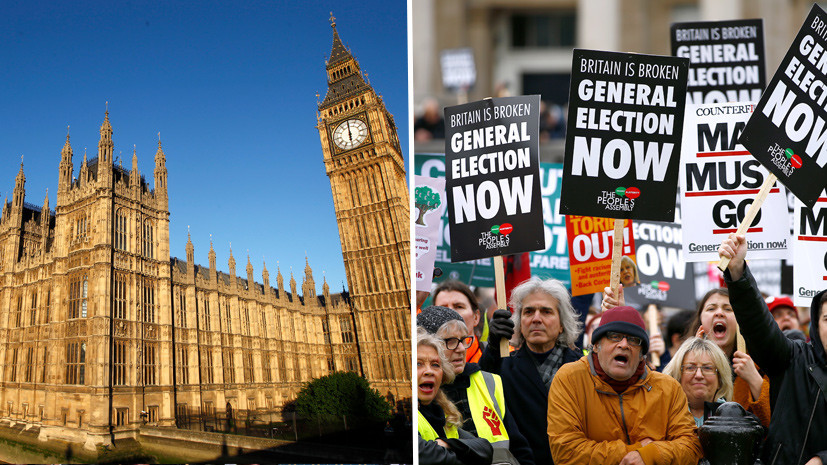On Tuesday, January 15, a vote will be held in the House of Commons of Great Britain on an agreement with the EU on the conditions for the withdrawal of the United Kingdom from the European Union. The government of the country supports the deal, which last year managed to be concluded by the head of the Cabinet, Teresa May. However, according to many British politicians, the document contains a number of weaknesses and does not protect the interests of the state. At the same time, Brussels emphasizes that this agreement is the only one possible. Thus, if he is not supported in parliament, Britain can expect so-called hard brexit.
On the eve of the project Theresa May was not supported by the vote in the House of Lords. The majority - 321 people - voted in favor of the proposal of Angela Smith, the leader of the Labor Party in the upper house of the British parliament, 152 - were against. The Smith paper, which was supported in the House of Lords, regrets the terms of the government deal with the EU.
"The result: the House of Lords votes by 321 votes for Angela Smith’s proposal to reject the result of the deal and regret the conditions of the government deal regarding future relations with the EU," the upper house of the British parliament says on Twitter.
RESULT: #HouseofLords votes 321 for, 152 against, so far, no matter how much you’ve agreed to.
- House of Lords (@UKHouseofLords) January 14, 2019The document, which initiated Smith, also called for the deputies of the House of Commons to "resolutely reject" the possibility of the UK leaving the EU without a deal.
The vote took place after a discussion in the House of Commons between Teresa May and Labor leader Jeremy Corbin. Then the prime minister called on deputies to support the agreement with the EU "for the sake of preserving the faith of the British people in democratic institutions." At the same time, Corbin criticized the head of government and called for extraordinary elections.
Earlier, the government postponed a vote on the Brexite deal between the UK and the European Union. Initially, it was supposed to take place at the end of December, however, May was forced to postpone it in mid-January in order to convince deputies to support the document during parliamentary holidays.
This decision was sharply criticized by the opposition. For example, on December 18, Corbin called on the House of Commons to vote for a vote of no confidence in the Prime Minister.
“It is completely obvious, unacceptable and unacceptable is the monthly expectation of a decisive vote on the most important issue concerning the future state,” he said.
May herself assesses this agreement as the "best option." She announced this after the talks on November 25, when London and Brussels agreed on the text of the document.
“The British do not want to spend more time arguing about Brexit. They want the proper execution of their will. I will bring this deal to the House of Commons, confident that the best option has been reached, ”she said.
"Accept or reject"
The 585-page agreement May managed to make with Brussels is the result of lengthy negotiations between London and Brussels. At the same time, the terms of the deal do not suit either the opposition or many members of the ruling Conservative Party.
Thus, according to The Daily Telegraph, more than a third of the deputies of the Conservative Party in the House of Commons intend to vote against the agreement.
Among the most unpopular points of the agreement is the preservation of Northern Ireland, which is part of the UK, within the European market. The document states that if a decision is not taken on these territories, the same norms of EU legislation will apply in Northern Ireland as in the territory of the Republic of Ireland. According to critics of May, this would mean the actual separation of the province from the rest of the United Kingdom.
Parliamentary party organizer Gareth Johnson noted that if this item continues, the United Kingdom will always remain in a dependent position on Eurosos and in this case the British’s desire to leave the EU expressed in the 2016 referendum will not be realized.
At the same time, this item in the transaction cannot be changed. As the European Commission’s head Jean-Claude Juncker, who represented Brussels at the talks, said on January 12, the EU will not revise the terms of the Brexit agreement.
“This is our last offer. We can add clarifications, but we will not revise it. The choice is this: accept or reject it, ”Juncker said.
In the event that the deputies do not accept the document, the UK implements the scenario for tough Brexit - the United Kingdom will withdraw from the European Union without concluding bilateral treaties with Brussels. This can have negative consequences for the country - as in a political one. so in the economic sphere.
British Defense Secretary Gavin Williamson assured parliamentarians that his department would be ready to mobilize 3.5 thousand soldiers in this case in order to support state structures.
At the same time, on December 18, the British Brexit Minister Stephen Barkley stated that the government is considering the country's withdrawal from the European Union as a matter of priority without any preliminary agreements.
“During the Cabinet meeting, we agreed that preparation for Brexit without an agreement would be in the operational priority of the government,” said the minister.

